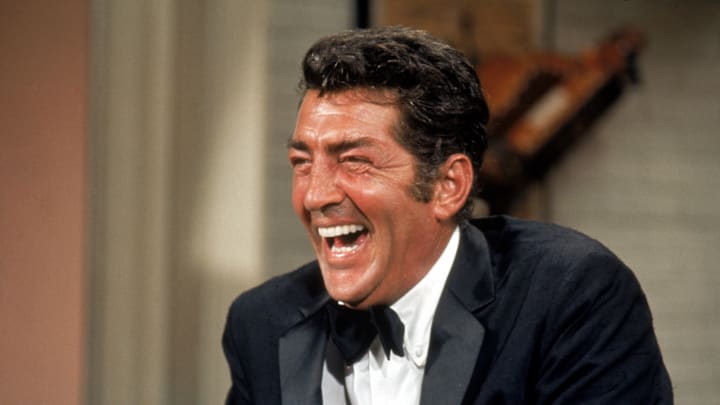When 82-year-old actress Cloris Leachman walked on stage during a 2008 roast of Full House actor and comedian Bob Saget, she insisted that she “wasn’t here to roast Bob Saget. I’m here to fuck John Stamos!”
Later, Leachman would tell Maxim Australia that she didn’t even know who Saget or Stamos were. Such is the dynamic of the celebrity roast, a tradition steeped in insults and offensive humor that’s back in the news cycle thanks to Netflix getting into the game: The streamer’s roast of former NFL player Tom Brady was a watercooler event thanks to Brady’s (seeming) annoyance at jokes over New England Patriots owner Robert Kraft and the heavy booing of Kim Kardashian (which Netflix later edited out).
It takes thick skin to endure these events, which have their roots in the 20th century New York City comedy scene and feature a variety of colleagues coming together to “honor” a special guest by means of verbal disembowelment.
The Friars Club
Honorary dinners are as old as the Last Supper: the roast was certainly derived from such ceremonial get-togethers. Clubs, fraternal organizations, and other assemblies often made an appointment to pay tribute to a member, a tradition that grew in popularity in the early 20th century.
The Friars Club, which was originally formed in 1904 as a place for New York theater agents to gather, took a different tact. Because many members were from vaudeville and trained stage comics, their gatherings took on a humorous bent. Teasing guests dates to at least 1910, when a news headline declared a “veteran theatrical manager” was “the butt of jokes” at the club. Later, the dinners were organized to help raise money for veterans of World War I.
The Friars Club decided to formalize the roast in 1949, when they invited French actor Maurice Chevalier to endure mistreatment. Soon, Humphrey Bogart, Lucille Ball, and other stars were being burned on stage.
These events were private and limited to members and guests only. Frequently dirty—broadcaster Larry King recalls being shocked at hearing someone say “fuck” on stage in the 1960s—they were hardly a fit for primetime.
Some of the more innocuous roasts were aired on Kraft Music Hall in the late 1960s. Shortly after, actor and singer Dean Martin led a series of roasts for NBC. Airing from 1973 to 1984, the specials kept the withering comments (many courtesy of insult legend Don Rickles) but refrained from being profane.
The Martin-hosted roasts deviated in one crucial way from the Friars gatherings. Owing to the economy of television and the conflicting schedules of guests, some of the roasts were taped in two places, with footage being spliced together. Some jokes might be delivered to an empty room.
In order to capture the true Friars sensibility, the club needed cable television.
Comedy Central Heats Up
Doug Herzog, the former president of Comedy Central, was a fan of the Martin roasts and had attended some of the private Friars events. In 1998, he partnered with the club to begin broadcasting the roasts, with the likes of everyone from Chevy Chase to Hugh Hefner being bludgeoned.
In 2003, the channel broke off from the Friars Club and produced the roasts in-house. Actor Denis Leary was the first roastee; comic Jeff Foxworthy was the second. (Foxworthy, like several roasted performers, opted to donate his proceeds to charity.) Comedian Jeff Ross became a tremendous asset for the network, having perfected the art of the insult and getting the made-up honorific of “roastmaster general.”
Not everyone took their ribbing in stride. Chase was described by many performers as annoyed and hurt. “Chevy Chase walked on stage and realized that almost none of his friends had shown up,” wrote Entertainment Weekly in 2012. “He was led to a red overstuffed chair, where he blinked into the television cameras—first stunned, then angry, then devastated—as various basic-cable personalities and B-list comics marched to the podium and trashed him.”
“[It] sounds like great fun, and ultimately it is, but unless you’re set mentally and emotionally, it could have a nightmarish quality to it,” said William Shatner, who was honored in 2006 and had the likes of Betty White denigrating him.
Despite appearances, roasts can wind up having a net positive effect. Charlie Sheen was mired in a public relations nightmare after public rants about being a “warlock” and departing his sitcom Two and A Half Men. His 2011 Comedy Central roast is credited with helping rejuvenate his image.
Comedy Central aired 17 roasts through 2019 and none since, leaving a gap that Netflix filled with the Brady roast. Given its success, the streamer will likely produce more.
The fate of the Friars Club is less certain. Burdened by financial issues, the club’s future is unclear. But their past is being preserved. In 2023, SiriusXM announced a channel devoted to audio of the private roasts, including Jack Black, Richard Pryor, Quentin Tarantino, and more.
